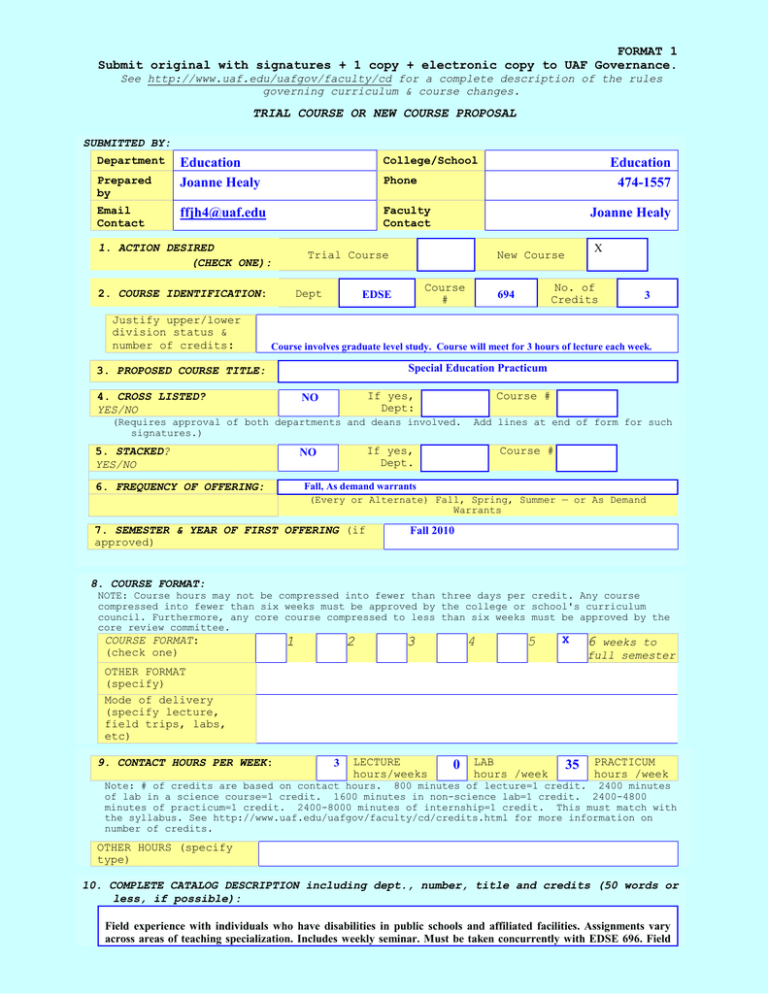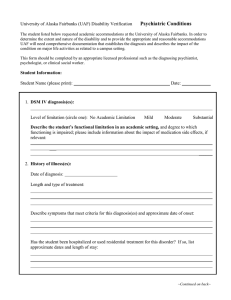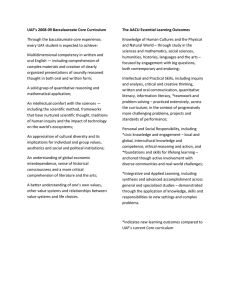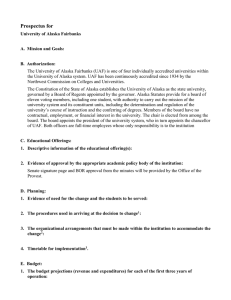FORMAT 1
advertisement

FORMAT 1 Submit original with signatures + 1 copy + electronic copy to UAF Governance. See http://www.uaf.edu/uafgov/faculty/cd for a complete description of the rules governing curriculum & course changes. TRIAL COURSE OR NEW COURSE PROPOSAL SUBMITTED BY: Department Prepared by Email Contact Education Joanne Healy College/School ffjh4@uaf.edu Faculty Contact 1. ACTION DESIRED (CHECK ONE): Joanne Healy Trial Course Dept 2. COURSE IDENTIFICATION: Justify upper/lower division status & number of credits: Education 474-1557 Phone X New Course Course # EDSE No. of Credits 694 3 Course involves graduate level study. Course will meet for 3 hours of lecture each week. Special Education Practicum 3. PROPOSED COURSE TITLE: 4. CROSS LISTED? YES/NO If yes, Dept: NO Course # (Requires approval of both departments and deans involved. signatures.) 5. STACKED? YES/NO If yes, Dept. NO 6. FREQUENCY OF OFFERING: Add lines at end of form for such Course # Fall, As demand warrants (Every or Alternate) Fall, Spring, Summer — or As Demand Warrants 7. SEMESTER & YEAR OF FIRST OFFERING (if approved) Fall 2010 8. COURSE FORMAT: NOTE: Course hours may not be compressed into fewer than three days per credit. Any course compressed into fewer than six weeks must be approved by the college or school's curriculum council. Furthermore, any core course compressed to less than six weeks must be approved by the core review committee. COURSE FORMAT: (check one) 1 2 3 4 5 X 6 weeks to full semester OTHER FORMAT (specify) Mode of delivery (specify lecture, field trips, labs, etc) 9. CONTACT HOURS PER WEEK: 3 LECTURE hours/weeks 0 LAB hours /week 35 PRACTICUM hours /week Note: # of credits are based on contact hours. 800 minutes of lecture=1 credit. 2400 minutes of lab in a science course=1 credit. 1600 minutes in non-science lab=1 credit. 2400-4800 minutes of practicum=1 credit. 2400-8000 minutes of internship=1 credit. This must match with the syllabus. See http://www.uaf.edu/uafgov/faculty/cd/credits.html for more information on number of credits. OTHER HOURS (specify type) 10. COMPLETE CATALOG DESCRIPTION including dept., number, title and credits (50 words or less, if possible): Field experience with individuals who have disabilities in public schools and affiliated facilities. Assignments vary across areas of teaching specialization. Includes weekly seminar. Must be taken concurrently with EDSE 696. Field experience required. Special fee. (3+0+35) 11. COURSE CLASSIFICATIONS: (undergraduate courses only. Use approved criteria found on Page 10 & 17 of the manual. If justification is needed, attach on separate sheet.) N = Natural Science H = Humanities S = Social Sciences Will this course be used to fulfill a requirement for the YES baccalaureate core? IF YES, check which core requirements it could be used to fulfill: O = Oral Intensive, Format 6 12. COURSE REPEATABILITY: Is this course repeatable for credit? W = Writing Intensive, Format 7 YES X NO Natural Science, Format 8 NO Justification: Indicate why the course can be repeated (for example, the course follows a different theme each time). How many times may the course be repeated for credit? TIMES If the course can be repeated with variable credit, what is the maximum number of credit hours that may be earned for this course? CREDITS 13. GRADING SYSTEM: LETTER: X PASS/FAIL: RESTRICTIONS ON ENROLLMENT (if any) Minimum of 24 Graduate credits in special education (May include the following UAF 14. PREREQUISITES courses EDSE: 605, 610, 612, 622, 624, 625, 632, 633, 640, 642, 677) Taken Concurrently with EDSE 696 These will be required before the student is allowed to enroll in the course. RECOMMENDED Classes, etc. that student is strongly encouraged to complete prior to this course. 15. SPECIAL RESTRICTIONS, CONDITIONS Admission to the Master in Education in Special Education Program or the Special Education Certification Program or permission of instructor. 16. PROPOSED COURSE FEES $150.00 Has a memo been submitted through your dean to the Provost & VCAS for fee approval? Yes/No NO 17. PREVIOUS HISTORY Has the course been offered as special topics or trial course previously? Yes/No If yes, give semester, year, course #, etc.: 18. ESTIMATED IMPACT WHAT IMPACT, IF ANY, WILL THIS HAVE ON BUDGET, FACILITIES/SPACE, FACULTY, ETC. The School of Education will hire an additional faculty member to teach special education courses. EDSE 694 will be taught by the new full time faculty member or a new adjunct faculty member. EDSE 694 will need a classroom with audio-conference capabilities. 19. LIBRARY COLLECTIONS Have you contacted the library collection development officer (ffklj@uaf.edu, 4746695) with regard to the adequacy of library/media collections, equipment, and services available for the proposed course? If so, give date of contact and resolution. If not, explain why not. No Yes X 10/10/08. Library has over 300 books and numerous journals in the special education field. Request was submitted for new book acquisition. 20. IMPACTS ON PROGRAMS/DEPTS What programs/departments will be affected by this proposed action? Include information on the Programs/Departments contacted (e.g., email, memo) Education 21. POSITIVE AND NEGATIVE IMPACTS Please specify positive and negative impacts on other courses, programs and departments resulting from the proposed action. Positive impacts: Increased admission to the UAF Master of Education program (Special Education Program). Potential for increased enrollment in existing teacher licensure programs for Elementary and Secondary education as applicants to the Special Education program must have a teaching certificate first. Increased enrollment in some existing M. Ed. classes (ED 601, ED 603, ED 698, ED 699) Increased exposure of existing M. Ed. programs (Curriculum and Instruction, Cross-Cultural Education, Language and Literacy, Reading, Counseling) with bundled advertising of the new program, may increase student enrollment in those programs. Negative impacts: An increase in the advising and graduate committee responsibilities for current faculty. Potential decrease in the number of applicants to existing M. Ed. program as students may select Special Education program instead of an existing program. JUSTIFICATION FOR ACTION REQUESTED The purpose of the department and campus-wide curriculum committees is to scrutinize course change and new course applications to make sure that the quality of UAF education is not lowered as a result of the proposed change. Please address this in your response. This section needs to be self-explanatory. Use as much space as needed to fully justify the proposed course. EDSE 694 is a part of the newly proposed special education certificate program and Master of Education in Special Education program. UAF is creating this complementary program to the current special education programs at UAA and UAS due to the severe shortage of qualified special education teachers in Alaska and nationwide. APPROVALS: SIGNATURES ON FILE AT THE GOVERNANCE OFFICE Signature, Chair, Program/Department of: Date Education, Graduate Program, Anthony Strange Signature, Chair, College/School Curriculum Council for: Signature, Dean, College/School of: Date Education, Anne Armstrong Date Education, Eric Madsen Date Signature of Provost (if applicable) Offerings above the level of approved programs must be approved in advance by the Provost. ALL SIGNATURES MUST BE OBTAINED PRIOR TO SUBMISSION TO THE GOVERNANCE OFFICE Date Signature, Chair, UAF Faculty Senate Curriculum Review Committee UAF School of Education: “Preparing professional educators who are culturally responsive, effective practitioners” EDSE 694 Practicum for Special Education Credits: 3.0 Instructor: Joanne Healy, M.S. Day & Time: Monday –Friday full days Office: Gruening Building 714A Location: TBA Phone: (907) 474-1557 E-mail: ffjh4@uaf.edu Office Hours: By appointment Prerequisite: Minimum of 24 Graduate credits in special education (May include the following UAF courses EDSE: 605, 610, 612, 622, 624, 625, 632, 633, 640, 642, 677) Taken Concurrently with EDSE 696 Required Readings Alaska State Special Education Handbook http://www.eed.state.ak.us/TLS/sped/Handbook.html Current and classic readings on selected topics including: Academic needs of school age children Current issues in special education Current practices in special education Meeting Special education standards Additional website and supplemental text/journal recommended readings will be assigned by the instructor dependent on weekly discussions. WEBSITES RELATED TO SPECIAL EDUCATION Council for Exceptional Children: www.cec.sped.org/ National Clearinghouse for Professions in Special Education: www.special-edcareers.org/ National Information Center for Children and Youth with Disabilities:www.nichy.org/ Alaska Department of Education and Early Development, special education. www.eed.state.ak.us/tls/sped U.S. Department of Education, Office of Special Education and Rehabilitative Services:www.ed.gov/offices/OSERS/ Technology websites list will be on class resources WEBSITES RELATED TO ALASKA NATIVE STUDIES Alaska Federation of Natives: www.nativefederation.org/flash.html Alaska Inter-Tribal Council : www.aitc.org/ Alaska Native Heritage Center:www.alasknative.net Alaska Native Knowledge Network: www.ankn.uaf.edu/index.html Justice Center Website:www.uaa.alaska.edu/just/rlinks/natives List of professional Organizations: Candidates should become familiar with the following organizations by collecting material, checking the websites etc. Candidates might wish to make up their own list of helpful websites based on organizations and specific advice and assistance for teaching student with learning problems. Council for Exceptional Children (CEC) American Psychological Association (APA) Learning Disabilities Association of America (LDAA) American Association for Mental Retardation (AAMR) The Association for the Severely Handicapped (TASH) International Reading Association (IRA) Disability Law Center - Fairbanks Special Education Service Agency (SESA) Other local associations and organizations with a focus on students with learning problems and people with disabilities. Course Materials: A computer with Internet access is required. A UAF email address and access to Blackboard is also required. I. COURSE DESCRIPTION Field experience with individuals who have disabilities in public schools and affiliated facilities. Assignments vary across areas of teaching specialization. Includes weekly seminar. Must be proficient in classroom setting and in the Council for Exceptional Children teaching standards. Must be taken concurrently with EDSE 696. Field experience of 35 hours per week is required. Special fee may be charged. Alignment With School of Education Mission The School of Education prepares educators to work in urban and rural Alaska and to work with K-12 students from many backgrounds, with a particular focus on Alaska Native languages and cultures. We are particularly committed to enhancing the educational opportunities for Alaska’s rural and Native populations. Through the UAF rural campuses, we are responsive to local and regional needs within the state. Through our programs and professional development courses, we promote the following goals: Increase the number of qualified educators for Alaska’s schools Enhance the professional skills of Alaska’s K-12 educators Develop and support ongoing systemic educational collaborations with Alaska schools and communities Conduct collaborative research on cross-cultural and multicultural education This course supports the UAF School of Education’s mission by providing students with the understandings and skills necessary to successfully address the diverse individual and cultural needs of Alaska’s students, schools, and communities. Emphasis is placed upon understanding students with exceptional needs. II. COURSE GOALS 1. To provide students with a practical training experience. 2. To provide students with the opportunity to evaluate and test special education policies and procedures within the context in which they must be made so as to be culturally responsive and effective. 3. To provide a means for students to assess their professional strengths and weaknesses. 4. To provide students with an opportunity to develop confidence in their ability to apply professional preparation in situations, yet shelter them from full responsibility while providing opportunities for their maximum professional growth. 5. To provide students professional experiences in actual interpersonal relationships that, involve ethical decision making skills and the evaluation of personal motives. Student Outcomes: The Council for Exceptional Children (CEC) Special Education Standards The Council for Exceptional Children (CEC) has developed 10 Special Education Standards that should guide and inform the work of all special education teachers. Candidates must be proficient in these areas. These are the expected outcomes of all candidates. CEC Special Education Standard 1: Foundations (demonstrate knowledge of the philosophies, historical, and legal issues that form the foundations of special education) CEC Special Education Standard 2: Development & Characteristics of Learners (demonstrate knowledge of characteristics of typical and atypical learners) CEC Special Education Standard 3: Individual Learning Differences (demonstrate understanding of the effects disabilities can have on an individual’s learning in school and throughout life) CEC Special Education Standard 4: Instructional Strategies (develop and utilize evidence-based instructional strategies to individualize instruction for individuals with disabilities) CEC Special Education Standard 5: Learning Environments & Social Interactions (create learning environments for individuals with disabilities that foster cultural understanding, safety, emotional well-being, and positive social interactions; knowledge of typical and atypical language development and the ways in which disabilities can interact with an individual’s experience with and use of language) CEC Special Education Standard 6: Communication (demonstrate knowledge of typical and atypical language development and the ways in which disabilities can interact with an individual’s experience with and use of language) CEC Special Education Standard 7: Instructional Planning (develop long-range individualized instructional plans anchored in both general and special curricula) CEC Special Education Standard 8: Assessment (demonstrate understanding of the legal policies and ethical principles of measurement and assessment related to referral, eligibility, program planning, instruction, and placement for individuals with disabilities, including those from culturally and linguistically diverse backgrounds) CEC Special Education Standard 9: Professional & Ethical Practice (act in a professional and ethical manner) CEC Special Education Standard 10: Collaboration (collaborate with families, other educators, related service providers, and personnel from community agencies in culturally responsive ways) Technology Focus This course will help you understand local, state, and national resources for regulations pertinent to the Individuals with Disabilities Education Act. Using technology as a means of accessing resources to collaborate and support parents and educators and to share during individual presentations. III. INSTRUCTIONAL METHODS This course will be taught using a variety of teaching methods including interactive lectures, audio conferences, Blackboard, internet research, reading assignments, student presentations, weekly seminar, classroom observation and participation. IV. COURSE POLICIES Attendance and Class Participation Students are expected to participate via audio conferences for all classes, participate in discussions, readings, and write reflections on the information presented. In case of an absence or tardiness, the student is responsible for getting information and completing an independent research assignment to be presented at the next class meeting to compensate for missed instruction. Regular attendance and classroom participation will be considered in determination of the final grade. Late assignments will only be accepted for a legitimate and excused absence. Since this a practicum course students are expected to be at their site daily and on time. Students are expected to call if they are unable to make it for extenuating circumstances. Excessive absences or tardiness is unacceptable and will be grounds for dropping the course or removal from the program. Readings Assigned readings for each class are listed in the class outline. It is expected the material has been read prior to the start of class. Assignments Due the day indicated on the syllabus. Plagiarism Academic integrity is a basic principle that requires all students to take credit only for the ideas and efforts that are their own. Plagiarism is defined as appropriating passages or ideas from another person’s work and using them as one’s own. Lifting passages of text from the Web is also plagiarism. Plagiarism is taken very seriously and may result in a student’s dismissal from the teacher education program. Assignments will be typed and submitted in standard written English, observing rules of grammar, spelling, punctuation and syntax. Research citations will be written APA style in all work, as this is the designated style and format for the field of educational research. Internet citations must include the title of the website, universal resource locator, date of posting, date of access and other information included on APA format. Professional and Ethical Behavior UAF School of Education students are expected to adhere to the Alaska Code of Ethics for the Education Profession. The standards, adopted by the Professional Teaching Practices Commission, govern all members of the teaching profession. A violation of the code of ethics and professional teaching standards are grounds for revocation or suspension of one’s teaching license. Student Code of Conduct and Expect Classroom Etiquette All guidelines and provisions of the UAF Student Code of Conduct will apply; see page 83 of the 2008-2009 UAF catalog or go to http://www.uaf.edu/catalog/current/academics/regs3.html for further details. Academic Support Services Writing support services are available on the UAF Campus in the Writing Center, located in 801 Gruening, (907) 474-5314. For students using distance delivery you can send your papers to the Writing Center using their Toll Free FAX 1-800-478-5246. They will FAX information back, and also email you regarding any questions. You need to use this resource at least once during the semester to meet writing expectations and to see what is available for students who may have a disability. Academic Support Services including library hours, computer lab hours/services, and writing center hours/services can be located at the following web site: http://www.uaf.edu/sssp/ Disabilities Services The Office of Disability Services (ODS) implements the Americans with Disabilities Act (ADA), and insures that UAF students have equal access to the campus and course materials. Disability Services, a part of UAF’s Center for Health and Counseling provides academic accommodations to enrolled students who are identified as being eligible for services. The UA F faculty makes every effort to work in conjunction with ODS to provide the necessary accommodations for all identified students enrolled in our courses. To access services, the student must provide current disability documentation that supports the requested services. If you believe you are eligible, please contact Disability Services on the UAF campus at 474-7043, fydso@uaf.edu, or visit http://www.uaf.edu/chc/disability.html on the web or contact a student and enrollment services staff person at your nearest local campus. Section 504 of the Rehabilitation Act of 1973 and the American with Disabilities Act of 1990 mandates disability support services. V. Course Requirements: 1. Regular attendance, preparation, and participation in class discussions. Students are expected to come fully prepared to participate in class discussions by having completed the required readings or activities before coming to class. Graduate seminars require a high level of personal involvement, accountability, and integrity. 2. Students are required to participate at their designated site for the full semester, generally 30-35 hours per week coordinated with the on-site supervisor 3. Students are expected to adhere to both the Council for Exceptional Children and the Alaska’s State Teachers codes of ethical behavior and standards of practice. 4. Students are expected to keep any personal information or views shared in class confidential; communicate in a timely manner any questions, concerns, conflicts, or needs to the appropriate supervisory personnel; and demonstrate teamwork, mutual respect, leadership, and an openness to professional feedback. 5. Students are expected to develop a working knowledge of the Alaska State Special Education Teacher Performance Standards. 6. Students are expected to complete all written course assignments and presentations on time; likewise, all evaluation materials are to be completed and turned in to the course instructor on the first day of finals week. VI. Course Assignments: 1. Students are required to complete a log of their practicum/internship hours, a weekly log of their on-site activities, meeting notes for all individual education plans (IEP) meetings attended in addition, students are to coordinate four (4) site visits with their on-site supervisor and UAF supervisor(s) during the semester. (400 points) 2. Students are required to complete an in depth case study using the case conceptualization format in the practicum/internship manual. Students will present their case study to the class for discussion purposes. (200 points) 3. Students are required to read one book of their choice written in first person regarding personal experiences dealing with a disability. They also need to be current on journal articles available in the library on the disability strand of choice and pick one article to highlight each week. Students will be responsible for leading a class discussion on one section of the special education manual. (100 points) 4. Two Site evaluations completed by on-site supervisor with input from on-site staff. (First evaluation 50 points, final evaluation 150 points) VII. Grading Policy: Evaluation will be based on converting course assignment points to percentages. Grades will be determined by the course instructor, based primarily on the degree to which students have demonstrated that they have met the objectives as outlined above, and as listed on the evaluation forms contained in the Practicum and Internship Manual. Site supervisors will be asked to utilize input from other school personnel in completing their evaluations. In addition, the instructor will take into account whether students evidence a clear understanding of the special education process as shown through their ability to articulate a concise explanation of their working model of special education. A 94% to 100% B 93% to 83% C 82% to 73% D 72% to 63% F Less than 63% VIII. COURSE CALENDAR In addition to the following topics, weekly discussion will include current trends and issues in special education via student report on journal articles and discussions regarding practicum and case study. Class 1 Syllabus & Introduction to Course SPECIAL EDUCATION HANDBOOK Class 2 PART I – INTRODUCTION Class 3 PART II - IDENTIFICATION Class 4 PART III - EVALUATION & ELIGIBILITY Class 5 REVISION PART IV - IEP DEVELOPMENT, IMPLEMENTATION, REVIEW & Class 6 PART V – PLACEMENT IN THE LEAST RESTRICTIVE ENVIRONMENT Class 7 PART VI – PROGRAM EXIT Class 8 PART VII – PROCEDURAL SAFEGUARDS & CONFIDENTIALITY Class 9 PART VIII - PERSONNEL Class 1 0 PART IX - FUNDING Class 1 1 PART X – COMPLIANCE MONITORING Class 1 2 PART XI – PARENT INFORMATION Class 13 REPORT PART XII STATE PERFORMANCE PLAN/ANNUAL PERFORMANCE Class 14 CASE STUDY REVIEWS


